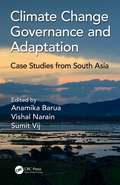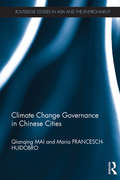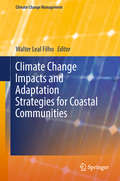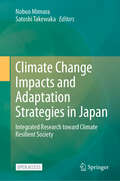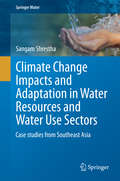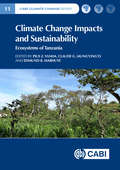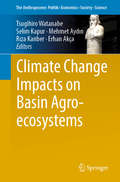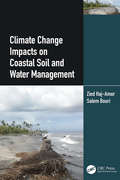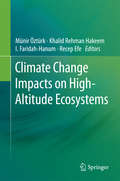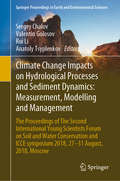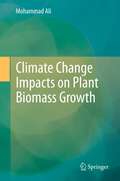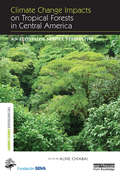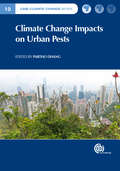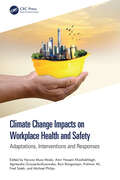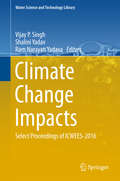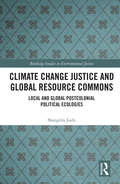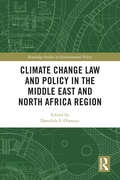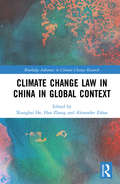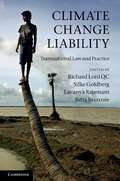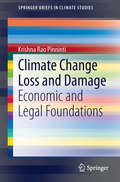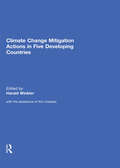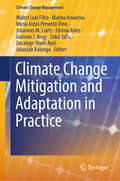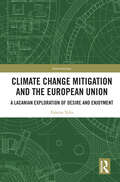- Table View
- List View
Climate Change Governance and Adaptation: Case Studies from South Asia
by Anamika Barua, Vishal Narain and Sumit VijClimate change adaptation in South Asia is redefining the roles of different actors in the governance processes. The existing governance lack capacity, knowledge, and leadership skills to manage the uncertainties and challenges posed by climate change. This book aims to explain how the governance of climate change adaptation and mitigation is being shaped in the region and how climate change is impacting upon the governance of natural resources. Although the focus is on South Asia, the editors draw a wide range of contributions from northern and southern communities and across various agro-ecological contexts. Climate Change Governance and Adaptation: Case Studies from South Asia sees the changing climate not only as an environmental problem but as a societal challenge and discusses the governance challenges from an interdisciplinary social science perspective across different levels: local, state, and national. Discusses also the challenges and opportunities for increasing the resilience of the society through effective governance around climate change. A top down approach to govern climate change adaptation may not yield desired outcomes; instead the book emphasizes the need to integrate issues of equity, into climate governance and polices. The lessons learned from different cases across South Asia help readers have a better and deeper understanding of the relationships between governance and climate change. Given the diversity of themes covered, this book will appeal not only to researchers and practitioners in the climate change community, but also to those with a broader interest in governance processes.
Climate Change Governance in Chinese Cities (Routledge Studies in Asia and the Environment)
by Qianqing Mai Maria Francesch-HuidobroIn the last thirty years, China has experienced rapid economic development and urbanisation which has resulted in high levels of environmental degradation and has put considerable pressure on the country’s infrastructure and natural resources. As China commits to considerably lower the carbon intensity of its economy, this volume analyses and explains the governance of climate change mitigation responses in major Chinese cities. The book focuses specifically on two highly carbon intensive sectors, buildings and transport, in Guangzhou, Shenzhen, and Hong Kong to explore how collaborative municipal networks function in practice in Chinese cities. The authors find that effective coordination relies on the political will of local administrative elites, the political significance attached to climate change issues, the legitimate authority granted to the coordinating agency, and human and financial capitals. Collaboration is hampered by limited span of network engagement, inadequate authority of the primary network participants, insufficient input and output legitimacy of the sectoral innovations, and missing linkages across functionally segregated sectors. The book concludes that the enhanced collaboration and coordination between networks that has emerged in the process of low carbon transitions is transforming the Chinese environmental state into a more pluralistic, inclusive and legitimate one. This book will be of interest to researchers and practitioners across disciplines including Chinese studies, environmental politics and policy, urban studies, and planning and geography.
Climate Change Impacts and Adaptation Strategies for Coastal Communities (Climate Change Management)
by Walter Leal FilhoThis book presents a comprehensive overview of research and projects regarding climate change adaptation in coastal areas, providing government and nongovernment bodies with a sound basis to promote climate change adaptation efforts. According to the 5th Assessment Report by the Intergovernmental Panel on Climate Change (IPCC), coastal zones are highly vulnerable to climate change, and climate-driven impacts may be further exacerbated by other human-induced pressures. Apart from sea-level rise, which poses a threat to both human well-being and property, extreme events such as cyclones and storm surges lead not only to significant damage to property and infrastructure, but also to salt water intrusion, groundwater salinisation, and intensified soil erosion, among many other problems. There are also numerous negative impacts on the natural environment and biodiversity, including damage to important wetlands and habitats that safeguard the overall ecological balance, and consequently the provision of ecosystem services and goods on which the livelihoods of millions of people depend. As such, there is a need for a better understanding of how climate change affects coastal areas and communities, and for the identification of processes, methods and tools that can help the countries and communities in coastal areas to adapt and become more resilient. It is against this background that this book has been produced. It includes papers written by scholars, social movements, practitioners and members of governmental agencies, pursuing research and/or executing climate change projects in coastal areas and working with coastal communities. Focusing on "managing climate change in coastal regions", it showcases valuable lessons learned from research and field projects and presents best practices to foster climate change adaptation in coastal areas and communities, which can be implemented elsewhere.
Climate Change Impacts and Adaptation Strategies in Japan: Integrated Research toward Climate Resilient Society
by Nobuo Mimura Satoshi TakewakaThis open access book presents the latest Japanese research for the projection of climate change impacts and the evaluation of adaptation policies, with a particular focus on the S-18 Project—a nationwide, interdisciplinary research initiative involving experts from various fields. Readers can get a comprehensive view of the latest knowledge and strategies to combat climate change impacts in Japan. The topics span the research framework and future scenarios for climatic and socio-economic changes, and impacts and adaptation measures in major sectors at both national and local levels. Target sectors include agriculture, forestry and fisheries, natural ecosystems, natural disasters and coastal zones, water resources, urban infrastructure, and transportation, quality of life and human health, and economic analysis of the impacts. The book features high-resolution spatial distribution of impacts, changes in vulnerability with localities, effects of mitigation and adaptation measures, and implications of climate change policies on society. As the world experiences increased extreme weather events, this comprehensive book is a timely reference for similar studies in other countries through the presentation of research results and lessons obtained in Japan. Researchers, policymakers, and academics in environmental science, climate policy, and related fields will find this book invaluable for understanding and addressing the multifaceted challenges of climate change adaptation and mitigation. Some chapters were written originally in Japanese. The English translation was facilitated by artificial intelligence. The authors later revised the content for accuracy.
Climate Change Impacts and Adaptation in Water Resources and Water Use Sectors: Case studies from Southeast Asia (Springer Water)
by Sangam ShresthaClimate change on earth is having significant impacts on water resources management in Southeast Asia. Knowledge of climate variations and climate change can be valuable for water resources management in agriculture, urban and industrial water supplies, hydroelectric power generation, and ecosystem maintenance. This book presents the findings of case studies on forecasting climate change and its impacts on water availability, irrigation water requirements, floods and droughts, reservoir inflows and hydropower generation, and crop yield in specific basins of Southeast Asian countries such as Thailand, Myanmar, and Vietnam. All case studies start by forecasting the climate change and investigating its impacts by employing several hydrological reservoir simulations and crop water requirement models. The findings provide sound and scientific advice for water managers on the real impacts of climate change and how to adapt to its many challenges.
Climate Change Impacts and Sustainability: Ecosystems of Tanzania (CABI Climate Change Series)
by Eugen Cyrilo Namkunda Johnson Richard J Katondo Godwin A Lema Emma T Liwenga N A Mbwambo Anselm R Mwajombe Patrick M Ndaki Agnes Ms Nyomora Noah M Pauline Florian Silangwa Kelvine C Shirima Pontian L Temba Adera Sisay Wassie Lucas E Yamat Josephine M ZimbaThis book provides a detailed analysis of the economic and environmental impacts of climate change on the tropical ecosystems in Tanzania. Topics covered include agriculture, marine resources, wildlife, and weather forecasting. The analyses concentrate on real and potential impacts of climate change, focusing on changes in temperature and precipitation. Adaptive capacity and strategies for enhancing resilience (such as changing crop types and crop patterns in farming) are described. Particular attention is paid to climate change impacts on vulnerability and resilience in communities and ecosystems with special reference to extreme events such as droughts and flooding. The book: is among the first books to analyse in detail climate change effects in Tanzania, highlighting the unique vulnerability of communities and ecosystems in East Africa from a socio-ecological point of view. discusses potential future threats as well as providing solutions to current problems. examines the application of local knowledge systems when formulating solutions. The book is essential reading for researchers on climate change and socio-economic impacts in tropical rural economies and of broad interest to climate change scientists, tropical ecologists, conservationists and agricultural scientists.
Climate Change Impacts on Basin Agro-ecosystems (The Anthropocene: Politik—Economics—Society—Science #18)
by Selim Kapur Erhan Akça Tsugihiro Watanabe Mehmet Aydın Rıza KanberThis book is based on the outcomes of a Turkish-Japanese bilateral project dealing with the impacts of climate change on basin agro-ecosystems. The book is unique in showing an up-to-date knowledge for the developing world. The chapters are related to: a) the development and improvement of a regional climate model for a more accurate prediction with higher resolution of future changes in regional climate, b) the structure of land and water management in agricultural production systems in arid areas, especially to quantitatively evaluate the relationships among cropping systems, hydrological cycle and water balance in farmland and its environments, c) the assessment of the impact of climate change and its adaptation on agricultural production systems, mainly on the aspect of land and water management, and d) the vulnerability of agricultural production systems from natural changes and the measures for enhancing sustainability of agriculture.This book elaborates on the methodologies for the assessment of climate change impacts on agricultural production and adaptationIn this book, the concepts and processes of an integrated approach are outlined, and its application in a case project is introducedThe approaches described in the chapters would be applicable in different situations and could be improved with experience and the introduction of advanced techniques
Climate Change Impacts on Coastal Soil and Water Management
by Zied Haj-Amor Salem BouriClimate Change Impacts on Coastal Soil and Water Management discusses the latest approaches for monitoring soil and water degradation in coastal regions under current climate conditions as well as potential further changes in the future. It presents an overview of climate change impacts on soil and water resources and summarizes the adaptation of practical options and strategies to minimize the potential risks, such as land degradation, seawater intrusion, droughts, ocean acidification, etc. The book aims to promote the adoption of best practices, which can be selected and implemented according to the respective local conditions. In addition, the recommendations for specific soil and water use planning strategies to address climate change can also be incorporated into national and international development plans. Features: • Presents the general properties and analysis of soil and water resource conditions for coastal regions • Offers practical advice for adapting to climate change through case studies from diverse coastal settings around the globe • Presents information in an accessible format for practitioners in soil and water sciences, as well as for those working in related disciplines • Includes end-of-chapter summaries and homework problems Written primarily for practicing soil, water, agricultural, and environmental scientists, this book provides the latest research on soil and water resources management, soil processes and properties, and the related effects of climate change. It assesses the effectiveness of the methods currently in use and under future climate change scenarios as well.
Climate Change Impacts on High-Altitude Ecosystems
by Khalid Rehman Hakeem Münir Öztürk I. Faridah-Hanum Recep EfeThis book covers studies on the systematics of plant taxa and will include general vegetational aspects and ecological characteristics of plant life at altitudes above 1000 m. from different parts of the world. This volume also addresses how upcoming climate change scenarios will impact high altitude plant life. It presents case studies from the most important mountainous areas like the Himalayas, Caucasus and South America covering the countries like Malaysia, Sri Lanka, India, Nepal, Pakistan, Kirghizia, Georgia, Russia,Turkey, Indonesia, Malaysia and the Americas. The book will serve as an invaluable resource source undergraduates, graduate students, and researchers.
Climate Change Impacts on Hydrological Processes and Sediment Dynamics: The Proceedings of The Second International Young Scientists Forum on Soil and Water Conservation and ICCE symposium 2018, 27–31 August, 2018, Moscow (Springer Proceedings in Earth and Environmental Sciences)
by Rui Li Sergey Chalov Valentin Golosov Anatoly TsyplenkovThis book offers a collection of conference articles presented at the Second International Young Scientists Forum on Soil and Water Conservation and ICCE symposium 2018 “Climate Change Impacts on Sediment Dynamics: Measurement, Modelling, and Management” held at Moscow from 27 to 31 August 2018. This conference was organized by World Association of Soil and Water Conservation (WASWAC) and Lomonosov Moscow State University in cooperation with the International Commission on Continental Erosion of the International Association of Hydrological Sciences and World Large rivers Initiative. Topics in this book cover a wide range of questions related to fluvial geomorphology, water studies, and sediment transport.
Climate Change Impacts on Plant Biomass Growth
by Mohammad AliThis book offers a methodical explanation of our biomass-driven ecosystem, the undeniable uncertainties posed by the response of vegetation to changes in environmental conditions and the fact that humans everywhere have an interest, even an obligation, to cooperate in a global campaign to combat climate change.
Climate Change Impacts on Tropical Forests in Central America: An ecosystem service perspective (The Earthscan Forest Library)
by Aline ChiabaiThe loss of biodiversity is a major environmental problem in nearly every terrestrial ecosystem on Earth. This loss is accelerating driven by climate change, as well as by other causes including agricultural exploitation, fragmentation and degradation triggered by land use changes. The crucial issue under debate is the impact on the welfare of current and future population, and the role of humans in the exploitation of natural resources. This is of particular importance in Central America, which it is amongst the richest and most threatened biodiversity regions on the Earth, and where the loss of ecosystems strongly affects its socio-economic vulnerability. This book addresses the impacts of climate and land-use change on tropical forest ecosystems in this important region, and assesses the expected economic costs if no policy action is taken, under different future scenarios and for different geographical scales. This innovative collection utilises both theoretical approaches and empirical results to provide a conceptual framework for an integrated analysis of climate and land-use change impacts on forest ecosystems and related economic effects, offering insight into the complex relationship between ecosystems and benefits to humans. This important contribution to forest ecosystems and climate change provides invaluable reading for students and scholars in the fields of environmental and ecological economics, environmental science and forestry, natural resource management, agriculture and climate change.
Climate Change Impacts on Urban Pests
by Partho DhangThis book is the first resource to review the influence of climate change on urban and public pests such as mosquitoes, flies, ticks, and wood pests, with respect to population, distribution, disease, damage and control. It systematically addresses how the impact of climate change on pests in urban areas differs from natural areas, focusing on the increased temperatures of urban locations, the effect of natural disasters, the manner of land use and the consequences of human habitation. Climate Change Impacts on Urban Pests: - covers key information on how climate change and urban pests affect human health - includes coverage of the impacts of natural disasters such as flooding looks at issues which could influence the management of pests - explores a range of international opinion from recognised authorities covering six continents. Presenting up-to-date knowledge, this book is an essential resource for researchers in urban pests, entomology and public health, as well as scientists, environmentalists and policy makers involved in studies on climate change.
Climate Change Impacts on Urban Pests (CABI Climate Change Series #7)
by David Liszka Roberto Pereira Richard Comont Steven Sims Arthur Appel Chester Moore Carrie Cottone Nan-Yao Su Donald Ewart Lina Nunes Teresa De Troya Magadelina Kutnik Mohamed Sallam Philip Koehler Aleksandra Gliniewicz Grzegorz Karbowiak Ewa Mikulak Marta Supergan-Marwicz Agnieszka Królasik Joanna Myslewicz Tamara Nunes de Lima-Camara Nildimar Alves Honório Eliningaya Kweka Dr Humphrey D. Mazigo Dr Yousif Himeidan Dr Domenica Morona Dr Stephen Munga Dr Ramesh Dhiman Pawel Swietoslawski Dr Martha Macedo De Lima BarataThis book is the first resource to review the influence of climate change on urban and public pests such as mosquitoes, flies, ticks, and wood pests, with respect to population, distribution, disease, damage and control. It systematically addresses how the impact of climate change on pests in urban areas differs from natural areas, focusing on the increased temperatures of urban locations, the effect of natural disasters, the manner of land use and the consequences of human habitation. Climate Change Impacts on Urban Pests: - covers key information on how climate change and urban pests affect human health - includes coverage of the impacts of natural disasters such as flooding looks at issues which could influence the management of pests - explores a range of international opinion from recognised authorities covering six continents. Presenting up-to-date knowledge, this book is an essential resource for researchers in urban pests, entomology and public health, as well as scientists, environmentalists and policy makers involved in studies on climate change.
Climate Change Impacts on Workplace Health and Safety: Adaptations, Interventions and Responses
by Haruna Musa Moda Amir Hossein Khoshakhlagh Agnieszka Gruszecka-Kosowska Ravi RangarajanClimate change has become the primary serious human and environmental threat of the 21st century and, with associated variability, it presents enormous potential to affect workers' safety and health. This book delivers vital information regarding climate change adaptation measures and workplace health and safety interventions across diverse sectors.This edited book delivers relevant information for specialists and academics to compare good practices across different sectors to help improve workplace safety and health as climate change factors continue to impact indoor and outdoor workplaces. In addition, it highlights the impact of extreme heat exposure and risk of climate-related chronic diseases, which could impact productivity, occupational safety adherence and wellbeing of workers. It also covers the impact of reduced work capacity due to climate change variability on the jobs undertaken. Comprehensive, up-to-date and including the latest references and cutting-edge case studies, this book reveals to the reader how to adapt accordingly for the impacts of climate change and to understand what the key issues are likely to be.Climate Change Impacts on Workplace Health and Safety: Adaptations, Interventions and Responses is a sobering but essential read for academics, researchers and professionals in health, safety, and environment (HSE) roles, occupational health engineering and environmental health specialists. Its appeal will extend to climate change scientists, epidemiologists and business and management professionals.
Climate Change Impacts: Select Proceedings of ICWEES-2016 (Water Science and Technology Library #82)
by Vijay P Singh Shalini Yadav Ram Narayan YadavaThis book comprises the select proceedings of the International Conference on Water, Environment, Energy and Society. The book is divided into four parts. Part I deals with some aspects of climatic characteristics ranging from changes in temperature and sunshine hours to downscaling to global climate patterns and effects of El Ni#65533;o-Southern Oscillation (ENSO) and Indian Ocean Dipole (IOD) on extreme rainfall. Part II covers rainfall analysis, including changes in regional rainfall series, analysis of non-stationarity, summer monsoon and rainfall scenarios. Impacts of climate change are treated in Part III. Change point analysis, greenhouse gas emissions, rainfall variability, water resources variability, and water resources sustainability are discussed in this part. The concluding Part IV is on low flow and drought. It deals with the Standardized Precipitation Index (SPI) concept and assessment of drought. This book is of interest to researchers and practitioners in the field of water resources, hydrology, environmental resources, agricultural engineering, watershed management, and earth sciences, as well as those engaged in natural resources planning and management. Graduate students and those wishing to conduct further research in water and environment and their development and management find the book to be of value.
Climate Change Justice and Global Resource Commons: Local and Global Postcolonial Political Ecologies (Routledge Studies in Environmental Justice)
by Shangrila JoshiThis book examines the multiple scales at which the inequities of climate change are borne out. Shangrila Joshi engages in a multi-scalar analysis of the myriad ways in which various resource commons – predominantly atmosphere and forests – are implicated in climate governance, with a consistent emphasis throughout on the justice implications for disenfranchised communities. The book starts with an analysis of North-South inequities in responsibility, vulnerability, and capability, as evidenced in global climate treaty negotiations from Rio to Paris. It then moves on to examine the ways in which structural inequalities are built into the conceptualization and operationalization of various neoliberal climate solutions such as Reducing Emissions from Deforestation and Forest Degradation (REDD+) and the Clean Development Mechanism (CDM). Drawing on qualitative interviews conducted in Delhi, Kathmandu, and the Terai region of Nepal, participant observation at the Climate Conference in Copenhagen (COP-15), and textual analysis of official documents, the book articulates a geography of climate justice, considering how ideas of injustice pertaining to colonialism, race, Indigeneity, caste, gender, and global inequality intersect with the politics of scale. This book will be of great interest to students and scholars of environmental justice, climate justice, climate policy, political ecology, and South Asian studies.
Climate Change Law and Policy in the Middle East and North Africa Region (Routledge Studies in Environmental Policy)
by Damilola S. OlawuyiClimate Change Law and Policy in the Middle East and North Africa Region provides an in-depth and authoritative examination of the guiding principles of climate change law and policy in the MENA region. This volume introduces readers to the latest developments in the regulation of climate change across the region, including the applicable legislation, institutions, and key legal innovations in climate change financing, infrastructure development, and education. It outlines participatory and bottom-up legal strategies—focusing on transparency, accountability, gender justice, and other human rights safeguards—needed to achieve greater coherence and coordination in the design, approval, financing, and implementation of climate response projects across the region. With contributions from a range of experts in the field, the collection reflects on how MENA countries can advance existing national strategies around climate change, green economy, and low carbon futures through clear and comprehensive legislation. Taking an international and comparative approach, this book will be of great interest to students, scholars, and practitioners who work in the areas of climate change, environmental law and policy, and sustainable development, particularly in relation to the MENA region.
Climate Change Law in China in Global Context (Routledge Advances in Climate Change Research)
by Alexander Zahar Hao Zhang Xiangbai HeIn Climate Change Law in China in Global Context, seven climate change law scholars explain how the country’s legal system is gradually being mobilized to support the reduction of greenhouse gas emissions in China and achieve adaptation to climate change. There has been little English scholarship on the legal regime for climate change in China. This volume addresses this gap in the literature and focuses on recent attempts by the country to build defences against the impacts of climate change and to meet the country’s international obligations on mitigation. The authors are not only interested in China’s laws on paper; rather, the book explains how these laws are implemented and integrated in practice and sheds light on China’s current laws, laws in preparation, the changing standing of law relative to policy, and the further reforms that will be necessary in response to the 2015 Paris Agreement on Climate Change. This comprehensive and critical account of the Chinese legal system’s response to the pressures of climate change will be an important resource for scholars of international law, environmental law, and Chinese law.
Climate Change Liability
by Richard Lord Jutta Brunnée Lavanya Rajamani Silke GoldbergAs frustration mounts in some quarters at the perceived inadequacy or speed of international action on climate change, and as the likelihood of significant impacts grows, the focus is increasingly turning to liability for climate change damage. Actual or potential climate change liability implicates a growing range of actors, including governments, industry, businesses, non-governmental organisations, individuals and legal practitioners. Climate Change Liability provides an objective, rigorous and accessible overview of the existing law and the direction it might take in seventeen developed and developing countries and the European Union. In some jurisdictions, the applicable law is less developed and less the subject of current debate. In others, actions for various kinds of climate change liability have already been brought, including high profile cases such as Massachusetts v. EPA in the United States. Each chapter explores the potential for and barriers to climate change liability in private and public law.
Climate Change Liability
by Richard Lord Jutta Brunnée Lavanya Rajamani Silke GoldbergAs frustration mounts in some quarters at the perceived inadequacy or speed of international action on climate change, and as the likelihood of significant impacts grows, the focus is increasingly turning to liability for climate change damage. Actual or potential climate change liability implicates a growing range of actors, including governments, industry, businesses, non-governmental organisations, individuals and legal practitioners. Climate Change Liability provides an objective, rigorous and accessible overview of the existing law and the direction it might take in seventeen developed and developing countries and the European Union. In some jurisdictions, the applicable law is less developed and less the subject of current debate. In others, actions for various kinds of climate change liability have already been brought, including high profile cases such as Massachusetts v. EPA in the United States. Each chapter explores the potential for and barriers to climate change liability in private and public law.
Climate Change Loss and Damage: Economic and Legal Foundations (SpringerBriefs in Climate Studies)
by Krishna Rao PinnintiThis text works to establish essential foundations and guidelines in the current process of providing strategies, mechanisms and resources for mitigating loss and damage from the adverse impacts of climate change and climate variability. This builds on the groundwork done by the UNFCCC and other entities to facilitate the processes at the international level, pursuing a pragmatic approach and the objective specification of relevant frameworks for further actions. The primary goal is the development of integrated approaches to the assessment and reduction of loss and damage due to climate change (including climate variability), encompassing both economic and legal dimensions. The publication is aimed at readers in top-level policymaking and strategy development on the national and international level, as well as academia.
Climate Change Mitigation Actions in Five Developing Countries
by Harald Winkler with the assistance of Kim CoetzeeFive case studies on mitigation actions (MAs) in developing countries illustrate the rich diversity of climate action. Researchers from Brazil, Chile, Colombia, Peru and South Africa reflect on what is possible in their countries. Case studies reflect the sheer diversity of NAMAs: from a ‘Pronami’ on efficient lighting in Peru, to longer-term challenges of rising energy emissions in Brazil, and much else. The book compares the similarities and differences across eight elements that could assist in developing and implementing mitigation. The comparative analysis highlights both how challenging implementation can be in the context of development, but also points to factors that might enable ambitious mitigation. The comparison suggests that choice of Mas may be linked to institutional capacity, the resources a country is endowed with and hence its emissions profile. International support can be an important global enabler. The authors find that addressing both development and climate objectives is key. This book fills an important gap in the literature from developing country authors about mitigation actions in their own countries. This book was published as a special issue of Climate and Development.
Climate Change Mitigation and Adaptation in Practice (Climate Change Management)
by Walter Leal Filho Marina Kovaleva Fátima Alves Johannes M. Luetz Gustavo J. Nagy Maria Alzira Pimenta Dinis Sidat Yaffa Desalegn Yayeh Ayal Jokastah KalunguThis book is part of the Climate Change Management Series. It includes the works focusing on climate change policies and technologies that support the implementation of climate change mitigation and adaptation strategies. The included works also discuss methodological approaches and experiences showing how the principles of climate change adaptation may be implemented in practice across various geographical regions. The book includes high-quality, interdisciplinary contributions on the scientific, social, economic, political aspects of climate change mitigation and adaptation solutions which makes it available to a wide audience professionals and practitioners.
Climate Change Mitigation and the European Union: A Lacanian Exploration of Desire and Enjoyment (Interventions)
by Valeria TolisThis book focuses on the European Union’s (EU) climate change mitigation actions, developing a critical framework for the 2030 Clean energy for all Europeans package and the 2050 long-term decarbonisation strategy, which informed the European Green Deal.Reflecting on the possibility of real change and transition, the author develops a Lacanian-based discourse analysis which reflects on agentic capacities and assesses both the status quo and changes in the discourse. Informed by extensive fieldwork in Brussels and at the UN Framework Convention on Climate Change Conferences of the Parties, this interdisciplinary book spans global environmental politics, international relations, EU studies, and discourse theories/analysis.It will be of particular interest to those working in critical theory, subjectivity, language, and materiality and intersects with a wide range of disciplines such as philosophy, sociology, anthropology, geography, linguistics, and psychology.
